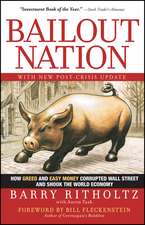Squatters as Developers?: Slum Redevelopment in Mumbai: King's SOAS Studies in Development Geography
Autor Vinit Mukhijaen Limba Engleză Paperback – 11 noi 2016
| Toate formatele și edițiile | Preț | Express |
|---|---|---|
| Paperback (1) | 338.33 lei 43-57 zile | |
| Taylor & Francis – 11 noi 2016 | 338.33 lei 43-57 zile | |
| Hardback (1) | 765.77 lei 43-57 zile | |
| Taylor & Francis – 28 apr 2003 | 765.77 lei 43-57 zile |
Preț: 338.33 lei
Preț vechi: 401.86 lei
-16% Nou
Puncte Express: 507
Preț estimativ în valută:
64.76€ • 70.37$ • 54.43£
64.76€ • 70.37$ • 54.43£
Carte tipărită la comandă
Livrare economică 21 aprilie-05 mai
Preluare comenzi: 021 569.72.76
Specificații
ISBN-13: 9781138258266
ISBN-10: 1138258261
Pagini: 208
Dimensiuni: 156 x 234 x 26 mm
Greutate: 0.45 kg
Ediția:1
Editura: Taylor & Francis
Colecția Routledge
Seria King's SOAS Studies in Development Geography
Locul publicării:Oxford, United Kingdom
ISBN-10: 1138258261
Pagini: 208
Dimensiuni: 156 x 234 x 26 mm
Greutate: 0.45 kg
Ediția:1
Editura: Taylor & Francis
Colecția Routledge
Seria King's SOAS Studies in Development Geography
Locul publicării:Oxford, United Kingdom
Cuprins
Contents: Introduction - A New Strategy in Mumbai: The puzzles of slum redevelopment; Placing the research in the context of the literature; A preview of the arguments; Study methodology; The structure of the book. The Evolution of the Slum Redevelopment Strategy: Introduction; The Mumbai context; The evolution of Mumbai's redevelopment strategy; Regulating the development potential of land. Decentralized Conflict: Introduction; Literature review; Dharavi redevelopment plan: contested intentions; PMGP and SPARC: the battle over Markandeya; Conflicts between SPARC and the private contractor; Uncivil society: distrust between SPARC and the community; SPARC's new role as a developer; Reexamining NGOs in housing delivery; Decentralization and centralization in housing delivery. Demolition and Redevelopment: Introduction; Literature review: tenure legalization; The physical structure of properties in Dharavi; Slum upgrading and slum redevelopment; Change in property rights and property attributes; High land values and medium-rise living; Slum redevelopment and tenure legalization; Demand-driven or supply-driven development. Financing Slum Redevelopment: Introduction; Literature review: markets and partnerships; State finance for redevelopment; Private capital from the non-profit and the for-profit sectors; Institutional responses to the scarcity of finance; Private and public roles. Enabling Slum Redevelopment in Mumbai: The Mumbai experience; An analytical framework for upgrading; The paradox of enabling; Future research; Squatters as developers; Appendices: Appendix 1 - list of interviewees; Appendix 2 - property values in Mumbai; Appendix 3 - Scion Shivaji Nagar CHS; Appendix 4 - Markandeya CHS: annexure II, SRD application; Appendix 5 - Cost estimate of the Rajiv Indira CHS; Notes; Bibliography; Index
Notă biografică
Vinit Mukhija, Assistant Professor, Department of Urban Planning, School of Public Policy and Social Research, University of California, Los Angeles (UCLA)
Recenzii
’This book weaves together in a masterful way spatial and social analyses of low-income housing delivery systems in developing countries. Drawing on extensive fieldwork in Mumbai, India, Professor Mukhija provides a unique insight into the institutional processes involving governments, nongovernmental organizations, market agents and community groups. Professor Mukhija's analysis goes far beyond the usual rhetoric of "private-public cooperation" and provides an astonishingly counter-intuitive description of institutional interaction which combines cooperation with conflict, state power with market forces, and community participation with community corruption. This is must reading for development planners.’ Professor Bishwapriya Sanyal, MIT, USA ’Just when we thought all of the arguments were in place for urban upgrading, self-help, and sites and services solutions to the world's low-cost housing problems, Vinit Mukhija presents a set of convincing arguments for slum redevelopment with impressive empirical evidence to back it up, from an ambitious housing project in Mumbai. Squatters as Developers? is "must" reading for those who analyze housing, urban politics, residential finance, urban planning, and social development, and particularly for those striving to find workable solutions to the challenge of housing low income populations, whether they live in the slums of U.S. cities or the barrios of Latin America.’ Professor Leland S. Burns, University of Cambridge, UK ’’
Descriere
In the mid-1990s, the state government of Maharashtra introduced an innovative strategy of slum redevelopment in its capital city, Mumbai (Bombay). Why and how did this strategy originate in Mumbai? What were the key issues in the project’s implementation? This critical volume responds to these questions by closely examining one particular redevelopment project: the Markandeya Co-operative Housing Society (MCHS).














